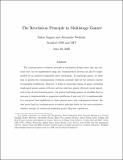The Revelation Principle in Multistage Games
Author(s)
Sugaya, Takuo; Wolitzky, Alexander Greenberg
DownloadAccepted version (611.8Kb)
Open Access Policy
Open Access Policy
Creative Commons Attribution-Noncommercial-Share Alike
Terms of use
Metadata
Show full item recordAbstract
The communication revelation principle (RP) of mechanism design states that any outcome that can be implemented using any communication system can also be implemented by an incentive-compatible direct mechanism. In multistage games, we show that in general the communication RP fails for the solution concept of sequential equilibrium (SE). However, it holds in important classes of games, including single-agent games, games with pure adverse selection, games with pure moral hazard, and a class of social learning games. For general multistage games, we establish that an outcome is implementable in SE if and only if it is implementable in a canonical Nash equilibrium in which players never take codominated actions. We also prove that the communication RP holds for the more permissive solution concept of conditional probability perfect Bayesian equilibrium.
Date issued
2020-08Department
Massachusetts Institute of Technology. Department of EconomicsJournal
Review of Economic Studies
Publisher
Oxford University Press (OUP)
Citation
Sugaya, Takuo and Alexander Wolitzky. “The Revelation Principle in Multistage Games.” Review of Economic Studies (August 2020): rdaa041 © 2020 The Author(s)
Version: Author's final manuscript
ISSN
0034-6527
1467-937X